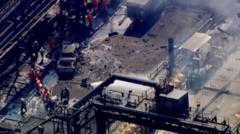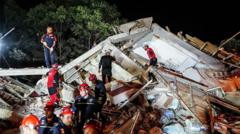A devastating explosion at Shahid Rajaee port in southern Iran has led to the deaths of 70 individuals, with investigators discovering false documentation regarding the hazardous cargo responsible for the blast. The incident raises serious safety concerns and prompts ongoing investigations.
Investigation Reveals False Documentation Linked to Deadly Iran Port Explosion

Investigation Reveals False Documentation Linked to Deadly Iran Port Explosion
Iranian officials confirm that misleading shipment documentation contributed to a massive explosion that has claimed 70 lives and injured over 1,200.
Iranian authorities are grappling with the aftermath of a catastrophic explosion at the Shahid Rajaee port, which has been linked to misleading shipping documentation. The incident, which occurred over the weekend, has resulted in a staggering death toll of 70 and injured nearly 1,200 others, with approximately 120 still receiving treatment in hospitals.
In their ongoing investigation, officials identified "false statements" in the documentation for the shipment that precipitated the blast. They assert that the cargo should have been classified as holding dangerous materials; however, it was instead treated like ordinary goods. This misclassification resulted in safety protocols being ignored, contributing to the scale of the disaster.
The explosion at Iran's largest port triggered a fire that unleashed gigantic plumes of black smoke visible from miles away. Surveillance footage captured the moments leading up to the blast, which demonstrated a rapidly escalating fire before the catastrophic detonation.
While details surrounding the cargo remain scarce, a source connected to the Islamic Revolutionary Guard Corps revealed that the chemical involved in the explosion was sodium perchlorate, a significant component used in missile solid fuel. This revelation has heightened concerns among authorities regarding potential security implications.
So far, the Iranian government has not disclosed specifics about the origins of the shipment, its containers, or the vessel that brought it into the port. This lack of transparency raises critical issues for Iran, particularly given that the Shahid Rajaee port is vital for the nation's economy, handling 85% of container traffic in the country and situated near strategic shipping routes.
The port has previously been the target of foreign cyberattacks, particularly from Israel, although officials have not indicated this latest explosion was linked to such external pressures. In an effort to assure the public, Ebrahim Azizi, chairman of the parliament’s security committee, has pledged transparency in the investigation process, committing to release findings promptly.




















